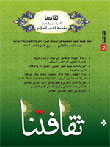فهرست مطالب
فصلنامه ثقافتنا
پیاپی 28 (1390)
- تاریخ انتشار: 1390/04/04
- تعداد عناوین: 7
-
صفحه 135
-
صفحه 161
-
صفحه 163
سم الله الرحمن الرحیم
شرع الإسلام منذ اربعه عشر قرنا «حقوق الإنسان» فی شمول وعمق، واحاطها بضمانات کافیه بحمایتها، وصاغ مجتمعه علی اصول ومبادی تمکن لهذه الحقوق وتدعمها.
والإسلام هو ختام رسالات السماء، التی اوحی بها رب العالمین إلی رسله علیهم السلام لیبلغها للناس، هدایه وتوجیها، إلی ما یکفل لهم حیاه طیبه کریمه، یسودها الحق والخیر والعدل والسلام.
-
Page 7Imam Khomeini’s remarks about the Islamic Revolution of Iran are indeed about the awakening of the entire Muslims across the world. When Imam Khomeini speaks ofthe causes of awakening of Iranian nation, the causes of victory of Islamic Revolution and the problems in the way of revolution and their solutions, he in fact tries to show theMuslims the rules of awakening and ways of their victory. Hence Imam Khomeini considers the attack of the imperialists and arrogant powers against the Islam Revolution as an attack on the awakening of the entire Muslims. Imam Khomeini considers the victory of the Islamic Revolution complete only when the entire world of Islam awakens and returns to its identity. Hence any weakness of the Islamic ummah will be a threat against the entire world of Islam. Therefore, he calls the Muslims, including the people and the rulers, to awareness, unity, resistance and return to their own selves to regain their self-confidence, for the Islamic world is single civilizational arena whose partition is not possible.
-
Page 33The 20th century is the era of great developments, which encompass all fields of human activities. This century witnessed great developments in the field of culture in theentire world with their clear impacts on the Arab, Islamic world. The cultural developments have led to the emergence of literary and art schools of thought as well as several intellectual trends. These developments in the Islamic world have enriched the cultural experiences of the Muslims and emergence of outstanding literary and cultural intellectuals. The greatest contemporary poets, writers and artists emerged in this century. These developments are quite observable in the Arab world, Iran, Indonesia and Indian subcontinent. Hence, the grounds were prepared in the 20th century for a great leap in the 21st century.
-
Page 61Corbin’s book, History of Islamic Philosophy, is a valuable work. Western and Eastern thinkers, including Seyed Musa Sadr, maintain that this book could acquaintedthe Westerners with the oriental thought. The significance of this work lies in its comprehensibility, for through a precise method it follows the history of Islamic philosophy.In the introduction of his book, Corbin reiterates that the history of Islam has not been subject to the intellectual imposition of the Church and hence freedom of thought hasbeen the pivot of intellectual trends in the Islamic world. Corbin classifies the history of philosophy into three stages: first, from the advent of Islam to the death of Averroes (IbnRushd) in the sixth century; second, thre centuries prior to the rise of Safavids; and third, sixteenth century AD.
-
Page 101The present paper is an attempt to offer a comparative study of the theory of epistemology in the viewpoints of MurtezaMutahari and Mohammad BaqirSar in order todiscuss their similarities and differences. Also the innovations of each of the said thinkers are discussed. Although they have made great contribution to the field of epistemology, there are many unfurrowed fields in this area which need to be explored.
-
Page 135Due to his humane discourse, Sa’diShirazi is known as the poet of humanity in the world, including the Arab world. His discourse focuses on dignity, moderation, education,aesthetic verve and sympathy with the fellow creatures. The present paper is an attempt to study the status of Sa’di in the Arab world with special attention to his place inAlgeria. The author has attended two seminars held in Algeria on Sa’di. In the second seminar, the author introduced Sa’di as a member of chain of Magnanimous Water Suppliers. The members of this chain attribute themselves to Abbas bin Ali,the Water Supplier of the camp of Imam Hussain in Karbala. The discourse of magnanimity of Sa’di has been discussed in the present paper.
-
Page 161DeclarationsThis section contains six issued documents on human rights in Islam.1 – Universal Declaration of Human Rights in Islam (London) 2 - Universal Declaration of Human Rights in Islam (Paris)3 – Concluding Statement of the Fifth Conference of Islamic Thought on Human Rights in Islam (Tehran)4 – Cairo Declaration of Human Rights in Islam (Cairo)5 - Universal Declaration of Human Rights in the Arab World (Arab League)6 - Declaration of Human Rights in Islam (Rome)


